
Journal of Cognitive Enhancement
Scope & Guideline
Pioneering Research for a Brighter Cognitive Future.
Introduction
Aims and Scopes
- Cognitive Training and Interventions:
Research aimed at understanding how specific cognitive training programs can enhance executive functions, memory, and overall cognitive performance in various populations including children, older adults, and individuals with cognitive impairments. - Neuroscience and Cognitive Functioning:
Investigations into the neurological underpinnings of cognitive enhancement, including studies on brain stimulation techniques, neurofeedback, and their effects on cognitive processes. - Physical Activity and Cognition:
Exploration of the relationship between physical exercise and cognitive enhancement, examining how different types of physical activities influence cognitive functions such as attention, memory, and executive control. - Mindfulness and Mental Health:
Studies focusing on mindfulness practices and their effects on cognitive processes, emotional regulation, and mental health outcomes, highlighting the role of mindfulness in enhancing cognitive abilities. - Leisure Activities and Cognitive Engagement:
Research examining how various leisure activities, including gaming and arts, contribute to cognitive enhancement and the maintenance of cognitive function throughout the lifespan.
Trending and Emerging
- Integration of Technology in Cognitive Training:
An increasing number of studies are exploring the use of digital platforms and applications for cognitive training, reflecting a trend towards accessible and scalable cognitive enhancement solutions. - Mindfulness and Cognitive Flexibility:
There is a growing interest in the role of mindfulness practices in enhancing cognitive flexibility and executive functions, indicating a shift towards understanding the psychological aspects of cognitive enhancement. - Interdisciplinary Approaches to Cognitive Enhancement:
Emerging research emphasizes the integration of insights from fields such as neuroscience, psychology, education, and physical training to create comprehensive cognitive enhancement strategies. - Effects of Physical Exercise on Cognitive Health:
Research highlighting the cognitive benefits of various forms of physical exercise, including novel training methods, is gaining traction, showcasing the connection between physical and cognitive well-being. - Community and Social Factors in Cognitive Enhancement:
There is an increasing focus on how social and community engagement influences cognitive health, reflecting a trend towards understanding the broader context of cognitive enhancement beyond individual interventions.
Declining or Waning
- Traditional Pharmacological Interventions:
There is a noticeable decline in studies focusing on pharmacological approaches to cognitive enhancement, as interest shifts towards non-invasive methods and lifestyle interventions. - Static Cognitive Assessments:
Research utilizing traditional, static cognitive assessment tools seems to be decreasing, with a move towards more dynamic and interactive assessment methods. - Cognitive Enhancement in Non-Clinical Populations:
The focus on cognitive enhancement strategies specifically for healthy individuals appears to be waning, as more studies are directed towards clinical populations or those with cognitive impairments. - Longitudinal Studies on Aging and Cognition:
While aging and cognition remain relevant, the volume of longitudinal studies exploring these themes is diminishing, possibly due to a shift towards experimental and intervention-based designs. - Impact of Nutritional Supplements:
Research on the cognitive effects of various nutritional supplements has decreased, suggesting a pivot towards more holistic and integrative approaches that include lifestyle factors.
Similar Journals

NEUROPSYCHOLOGY REVIEW
Bridging Psychology and Neuroscience for Deeper InsightsNEUROPSYCHOLOGY REVIEW is a prestigious journal published by Springer, dedicated to the exploration of cognitive processes and behavior through neurological and psychological perspectives. With its ISSN 1040-7308 and E-ISSN 1573-6660, this journal holds a distinguished position in Q1 of the Neuropsychology and Physiological Psychology category, ranking at #3 out of 76 with an impressive 96th percentile in Scopus. Since its inception in 1990, it has provided a critical platform for researchers, professionals, and students to disseminate and engage with comprehensive reviews and empirical research, promoting a deeper understanding of the interplay between neural mechanisms and psychological phenomena. Aimed at fostering interdisciplinary collaboration and advancement in the field, NEUROPSYCHOLOGY REVIEW invites contributions that push the boundaries of knowledge and stimulate ongoing debates in neuropsychology, making it an invaluable resource for anyone interested in the latest scientific advancements within this dynamic area.

EXPERIMENTAL BRAIN RESEARCH
Bridging Theory and Experimentation in Brain ScienceEXPERIMENTAL BRAIN RESEARCH is a renowned journal published by SPRINGER, dedicated to advancing understanding in the field of neuroscience. With a history dating back to 1966, this journal offers valuable insights into the mechanisms of brain function and neurological disorders, making it a vital resource for researchers, professionals, and students alike. While it currently holds a Q3 classification in the field of Neuroscience (miscellaneous) and ranks #73 out of 113 in Scopus's General Neuroscience category, it continually contributes to fostering innovative research and collaborative dialogue. The journal is not open access, ensuring that although content is subscription-based, it maintains a high standard of peer review and scholarly rigor. By covering a breadth of topics relevant to both experimental and theoretical aspects of brain research, EXPERIMENTAL BRAIN RESEARCH serves as an essential platform for disseminating cutting-edge discoveries and theories in the dynamic realm of neuroscience.
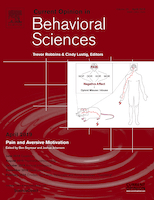
Current Opinion in Behavioral Sciences
Fostering Interdisciplinary Understanding in Behavioral SciencesCurrent Opinion in Behavioral Sciences, published by ELSEVIER, is a premier academic journal that provides insightful and comprehensive reviews of contemporary research in the fields of behavioral neuroscience, cognitive neuroscience, and psychiatry and mental health. With an impressive Q1 ranking in multiple categories and Scopus rankings that highlight its influence—4th in Behavioral Neuroscience and 8th in Cognitive Neuroscience—this journal has positioned itself as a leading platform for disseminating high-quality scholarly work. Accessible to readers in the United Kingdom and beyond, it plays a vital role in advancing knowledge and understanding of behavioral science and its applications. Its impact is further underscored by its percentile rankings in key fields, making it an essential resource for researchers, professionals, and students seeking to stay abreast of the latest developments and trends from 2015 to 2024. This journal aims to bridge the gap between cutting-edge research and practical application, fostering a collaborative and interdisciplinary approach to pressing issues in behavioral sciences.

Behavioral and Brain Functions
Bridging Gaps in Behavioral and Biological PsychiatryBehavioral and Brain Functions is a leading Open Access journal published by BMC, dedicated to advancing the field of behavioral neuroscience, cognitive neuroscience, and biological psychiatry since its inception in 2005. This esteemed journal, based in the United Kingdom, has established itself as a vital resource for researchers and professionals, boasting a remarkable influence demonstrated by its Q1 and Q2 rankings across multiple relevant categories. With its commitment to providing unrestricted access to high-quality research, the journal facilitates the dissemination of significant findings in understanding the complex interactions between behavior and brain function. The journal ranks impressively within the Scopus database, positioning itself among the top-tier publications in its categories, making it an essential platform for academic discourse and innovation. As it converges through 2024, Behavioral and Brain Functions continues to play a crucial role in shaping the forefront of neuroscientific inquiry, inviting contributions that challenge our understanding and promote further exploration in these dynamic fields.
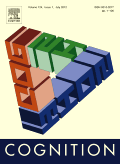
Cognition
Leading the Way in Cognitive Research ExcellenceCognition, published by Elsevier, is a leading journal dedicated to the exploration and advancement of knowledge in the multifaceted fields of cognitive neuroscience, cognitive psychology, and linguistics. Since its inception in 1972, this prestigious journal has established itself as a prominent platform for disseminating innovative research and critical reviews, achieving a remarkable Q1 ranking across various relevant categories, including Cognitive Neuroscience and Developmental Psychology, as per the 2023 metrics. With a focus on providing insights that are vital for researchers, professionals, and students alike, Cognition boasts an impressive standing in the academic community, evidenced by its high Scopus rankings which place it in the top percentiles in several disciplines. Researchers interested in the cognitive processes underlying human thought, language, and behavior will find Cognition an invaluable resource that publishes cutting-edge findings and fosters interdisciplinary collaboration. Though it operates under a traditional access model, the breadth and depth of its content ensure it remains integral to advancing cognitive science.

Neuropsychological Trends
Fostering Collaboration for a Brighter Neuropsychological FutureNeuropsychological Trends is a prominent, open-access journal published by LED EDIZIONI UNIV, based in Italy. Since its inception in 2007, the journal has dedicated itself to advancing research in the fields of neuropsychology and cellular neuroscience, catering specifically to the evolving trends shaping these disciplines. With the ISSN 1970-321X and an E-ISSN of 1970-3201, the journal provides a platform for multidisciplinary dialogue and exploration of neuropsychological phenomena. While ranked in the fourth quartile for both Cellular and Molecular Neuroscience and Neuropsychology and Physiological Psychology categories in 2023, the journal encourages innovative research that aims to enhance understanding and treatment of cognitive and psychological conditions. The convergence of years from 2011 to 2024 marks a significant period for contributions that inform clinical practice and theoretical frameworks. As researchers, professionals, and students engage with cutting-edge studies and reviews, Neuropsychological Trends serves as a vital resource for staying informed and fostering collaboration in the neuropsychological community.
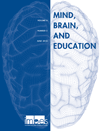
Mind Brain and Education
Unlocking Potential: Where Science Meets LearningMind, Brain, and Education is a pioneering journal published by WILEY, focusing on the intersection of cognitive neuroscience, developmental psychology, and educational practices. With an ISSN of 1751-2271 and E-ISSN 1751-228X, this esteemed publication offers a platform for researchers and educators to disseminate innovative findings that bridge theory and practice in learning environments. Spanning from 2008 to 2024, the journal has established a reputation as a vital resource in the academic community, recognized in 2023 as Q2 in Developmental and Educational Psychology and Education, and Q3 in Cognitive Neuroscience and Experimental and Cognitive Psychology. With Scopus ranks demonstrating its impact, especially in Education and Psychology fields, Mind, Brain, and Education invites submissions that advance knowledge and application of educational strategies informed by brain science. Researchers, professionals, and students will find critical insights and collaborative opportunities to enhance educational outcomes and cognitive development in learners.
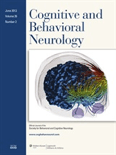
Cognitive and Behavioral Neurology
Illuminating the Pathways of Cognitive and Behavioral HealthCognitive and Behavioral Neurology is a prominent peer-reviewed journal dedicated to advancing the understanding of cognitive and behavioral aspects of neurological disorders. Published by Lippincott Williams & Wilkins, this journal has established itself as a vital resource for researchers, clinicians, and students in the fields of cognitive neuroscience, neuropsychology, and psychiatry. With an ISSN of 1543-3633 and an E-ISSN of 1543-3641, it offers a robust platform for the dissemination of high-quality research, as evidenced by its positioning in the Q3 quartiles across various categories, including Cognitive Neuroscience and Psychiatry. The journal, which has been actively publishing since 2003, encourages innovative studies that explore the intersection of cognition and behavior in neurological contexts. As a vital contributor to the academic dialogue on these topics, it provides an essential archive of findings and discussions that inform clinical practice and educational approaches, reflecting its commitment to improving patient outcomes and enhancing neurological science.
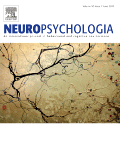
Neuropsychologia
Advancing Insights into Behavioral and Cognitive ProcessesNeuropsychologia, published by PERGAMON-ELSEVIER SCIENCE LTD, is a premier journal that delves into the intersections of psychology and neuroscience, specifically focusing on behavioral and cognitive processes. Since its inception in 1963, this esteemed journal has been a vital platform for researchers, professionals, and students, showcasing innovative studies and advancements in the fields of Behavioral Neuroscience, Cognitive Neuroscience, and Experimental Psychology. With a commendable impact factor, placing it in the Q2 category across multiple disciplines, Neuropsychologia is recognized for its contribution to the scientific community, ranking among the top journals in both Experimental and Cognitive Psychology and Neuroscience. The journal's commitment to excellence is evident in its rigorous peer-review process and its mission to disseminate cutting-edge research, making it an invaluable resource for those seeking to expand their knowledge and insights in neuropsychology. For further reading, the journal is accessible in both print and digital formats, ensuring that researchers can easily engage with the latest findings and theoretical advancements in this dynamic field.
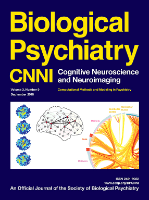
Biological Psychiatry-Cognitive Neuroscience and Neuroimaging
Illuminating the Pathways of Cognitive NeuroscienceBiological Psychiatry-Cognitive Neuroscience and Neuroimaging is a leading interdisciplinary journal published by Elsevier, focusing on the convergence of biological psychiatry, cognitive neuroscience, and advanced neuroimaging techniques. With its prestigious Q1 rankings across essential categories such as Biological Psychiatry, Cognitive Neuroscience, and Neurology (clinical), this journal is at the forefront of research that examines the complexities of mental health through innovative methodologies. Covering a broad spectrum of topics from neurobiological mechanisms to clinical applications, it aims to provide a platform for scholars and practitioners to exchange insights on mental disorders and their neurobiological underpinnings. The impact factor and Scopus rankings further underscore its importance, with rankings highlighting its position in the top percentiles of related disciplines. By fostering an open exchange of ideas and promoting cutting-edge research, this journal is an essential resource for researchers, professionals, and students dedicated to advancements in the understanding and treatment of psychiatric and neurological conditions.